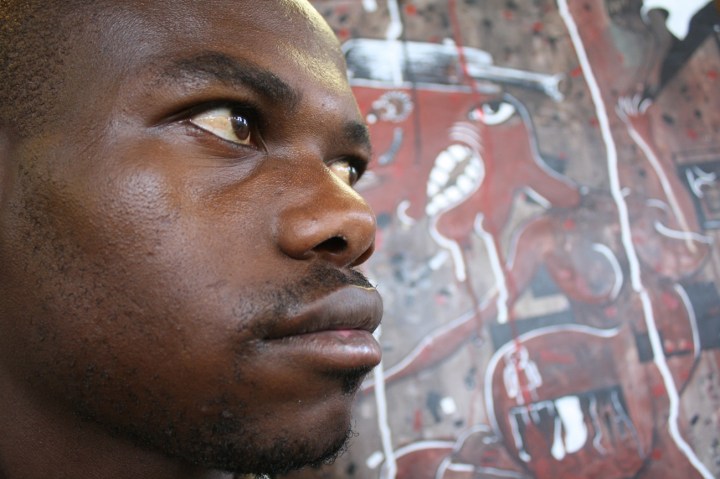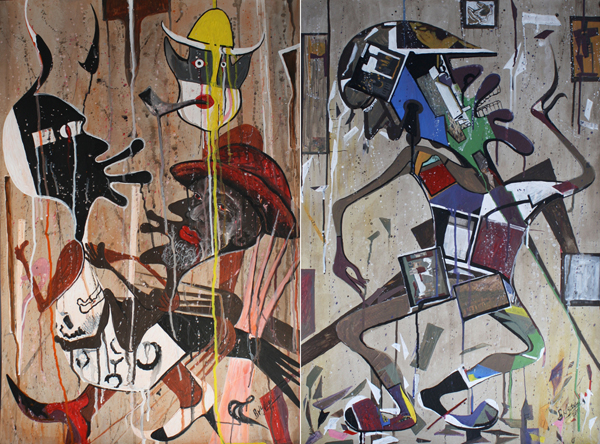Maverick Life, Media, South Africa
No disguise in Blessing’s work

From a small space in Hillbrow, Blessing Ngobeni is producing award-winning work reminiscent of the style of Miró, but it’s work that is fiercely critical of South Africa’s political elite. This year’s winner of a major art award, Ngobeni now has the opportunity to ensure his work reaches a broader canvas in his quest to open people’s eyes to South Africa’s lived reality. By MANDY DE WAAL.
Blessing Ngobeni is a man who’s experienced a lot. A young runaway, he lived in the bush for three years and survived hand to mouth before heading to Johannesburg, where crime appeared to offer a better experience of life. Ngobeni ended up in prison where he discovered art, and made the choice to try living a better life.
“I have experienced challenging things, like many South Africans,” Ngobeni tells Daily Maverick. “I grew up in a broken home. I ran away from that home at a very early age, ended up in Jozi, and got involved in crime. This is the usual South African story,” says the the 27-year-old.
“I ended up in prison as a teenager and it was there that I had a choice, and luckily I discovered art, which made the choice to change the course of my life easier, because I was able to express myself through art. This story obviously influences everything I do now, as an adult: how I live, how I create art,” Ngobeni says.
Ngobeni’s choice to experience life as an artist is paying off because he’s just won the Reinhold Cassirer Award, supported by Nadine Gordimer, the Nobel laureate. The award is named after Gordimer’s second husband, an art dealer who died in 2001. The pair had been married for well over 40 years.
The award is aimed at emerging artists whose work shows enormous potential, but who haven’t had the opportunity to realise this potential. “I feel like somewhere, somehow my creativity has been limited by the tiny room, which I use to sleep in and to work in as a studio,” Ngobeni wrote in his award application.
“I share this room with my two-year-old son who is around me all the time. He needs my attention, yet I need to pay attention to the creation of my art. I find it difficult to broaden my creativity while the unemployed mother of my child is trying to keep our tiny little room tidy.” Ngobeni uses his art as a means to support his wife and son.

Photo: Blessing at Unity Gallery in Newtown. PHOTO COURTESY OF UNITY GALLERY.
“I live and walk all around the city, but living in Hillbrow itself is like living in hell,” Ngobeni says. “The things that happen there upset you and they shut off your freedom. It’s like living in a world where things do not function normally, as they should. Art is a way to live in this place – it’s also a way of representing people in the area who have no voice themselves. The city itself… if you don’t have the connection or the inspiration within yourself when you live in the city you are voiceless. Being an artist in the city is a way to have a voice.”
After winning the award Ngobeni will be afforded a space to work and create at the Bag Factory’s studios in Fordsburg, interact with artists there, and benefit from an association with an established studio with an extensive network. Artists associated with, or who have passed through, the Bag Factory include KendellGeers, Penny Siopis, Dominic Tshabangu, Stephen Maqashela, Fatima Fernandes and Paul Emmanuel.
Despite Ngobeni’s challenges and the physical limitations of his work space to date, the art he has produced is inspired and is said to be influenced by Norman Catherine and Miró, but still remains true to Ngobeni’s township roots and speaks to the extraordinary experiences he’s had.
South Africa isn’t kind to emerging artists. “The lack of opportunities means that it’s very difficult for an artist. The imbalance in the political and economic system on the street makes life impossible. But up there where others like politicians and such live, there is balance.”
Ngobeni’s work is political and makes a strong, almost satirical statement about this country’s people of power who appear to have all but forgotten those who have enabled this power. “Politicians are using the structures to oppress those who vote for them,” says Ngobeni.
One of the young artist’s new pieces is called Democracy is a Dust Bin. It has this name because Ngobeni feels that democracy is a place where the elite throw their rubbish. “I try to create a wake-up call to people who aren’t aware of what’s happening. The city is not portrayed accurately by politicians. People are masked and covered up by the buildings. The buildings are a façade – they make a good skyline, but no one sees what is going on inside,” he says.

Photo: Two of his works – This Is So-Called Democracy, and, This Is So-Called Politics. PHOTOS COURTESY OF UNITY GALLERY.
For people like Ngobeni the lived reality is completely different. “People are packed and packed into rooms and flats, many whole families packed into rooms. You don’t see this from the aeroplane, or when you’re looking at the city at night and it shines. Often there is no recognition of what our cities really are, of how they really work. Democracy is a dustbin,” he says.
His work is now being recognised, but that wasn’t always the case. “The galleries I used to go to who rejected my work are starting to recognise me as someone who is using art as a weapon of expression. Winning the award was a big achievement for me – it has brought me close to what I live for. I am digging deep within to find myself through art and using art as a weapon to progress and to overcome the obstacles I face.”
“When I look into the eyes of my people and they can’t speak for themselves. I feel angry. Looking at the situation of our democracy, I feel it’s an indirect war against our people. It makes me angry,” says Ngobeni.
His work is a potent reminder of the poverty this country’s political aristocrats have left behind and refuse to look. Kudos to people like Nadine Gordimer and the Reinhold Cassirer Award, The Bag Factory and the owners of Unity Gallery, where Ngobeni is resident. Their involvement in supporting artistic truths realises a larger veracity, where the expression of people’s marginalised realities becomes ever harder to ignore. DM
Read more:
- Taxpayers dish out R10m for “private” exhibition in Mail & Guardian.
- Court Papers Served on the Department of Arts and Culture at ArtThrob.
- See Blessing Ngobeni’s art at Unity Gallery.
Photo: Blessing Ngobeni is South Africa’s own Miró. PHOTO COURTESY OF UNITY GALLERY.



















 Become an Insider
Become an Insider